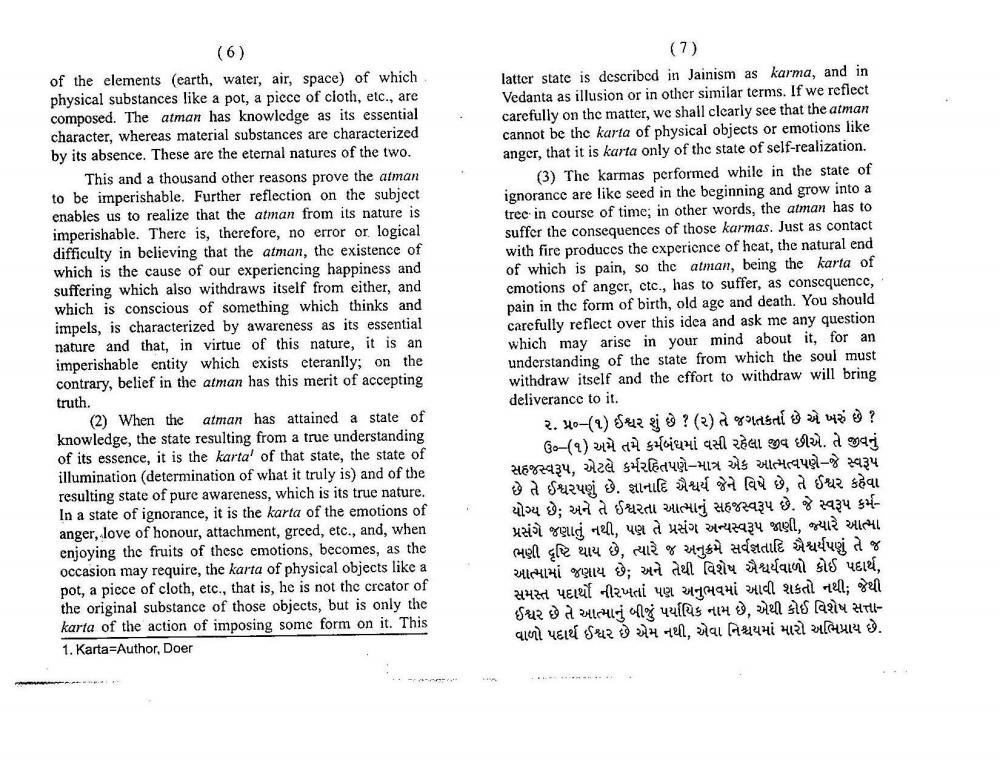________________
(6)
of the elements (earth, water, air, space) of which physical substances like a pot, a piece of cloth, etc., are composed. The atman has knowledge as its essential character, whereas material substances are characterized by its absence. These are the eternal natures of the two.
This and a thousand other reasons prove the atman to be imperishable. Further reflection on the subject enables us to realize that the atman from its nature is imperishable. There is, therefore, no error or logical difficulty in believing that the atman, the existence of which is the cause of our experiencing happiness and suffering which also withdraws itself from either, and which is conscious of something which thinks and impels, is characterized by awareness as its essential nature and that, in virtue of this nature, it is an imperishable entity which exists eteranlly; on the contrary, belief in the atman has this merit of accepting truth.
(2) When the atman has attained a state of knowledge, the state resulting from a true understanding of its essence, it is the karta' of that state, the state of illumination (determination of what it truly is) and of the resulting state of pure awareness, which is its true nature. In a state of ignorance, it is the karta of the emotions of anger, love of honour, attachment, greed, etc., and, when enjoying the fruits of these emotions, becomes, as the occasion may require, the karta of physical objects like a pot, a piece of cloth, etc., that is, he is not the creator of the original substance of those objects, but is only the karta of the action of imposing some form on it. This 1. Karta-Author, Doer
エリー
(7)
latter state is described in Jainism as karma, and in Vedanta as illusion or in other similar terms. If we reflect carefully on the matter, we shall clearly see that the atman cannot be the karta of physical objects or emotions like anger, that it is karta only of the state of self-realization.
(3) The karmas performed while in the state of ignorance are like seed in the beginning and grow into a tree in course of time; in other words, the atman has to suffer the consequences of those karmas. Just as contact with fire produces the experience of heat, the natural end of which is pain, so the atman, being the karta of emotions of anger, etc., has to suffer, as consequence, pain in the form of birth, old age and death. You should carefully reflect over this idea and ask me any question which may arise in your mind about it, for an understanding of the state from which the soul must withdraw itself and the effort to withdraw will bring deliverance to it.
૨. પ્ર(૧) ઈશ્વર શું છે ? (૨) તે જગતકર્તા છે એ ખરું છે ? ઉ(૧) અમે તમે કર્મબંધમાં વસી રહેલા જીવ છીએ. તે જીવનું સહજસ્વરૂપ, એટલે પરહિતપણે માત્ર એક આત્મત્યપણે જે સ્વરૂપ છે તે ઈશ્વરપણું છે. શાનાદિ ઐશ્વર્ય જેને વિષે છે, તે ઈશ્વર કહેવા યોગ્ય છે; અને તે ઈશ્વરતા આત્માનું સહજસ્વરૂપ છે. જે સ્વરૂપ કર્મ પ્રસંગે જણાતું નથી, પણ તે પ્રસંગ અન્યસ્વરૂપ જાણી, જ્યારે આત્મા ભણી દૃષ્ટિ થાય છે, ત્યારે જ અનુક્રમે સર્વજ્ઞતાદિ ઐશ્ચર્યપણું તે જ આત્મામાં જણાય છે; અને તેથી વિશેષ ઐશ્વર્યવાળો કોઈ પદાર્થ, સમસ્ત પદાર્થો નીરખતાં પણ અનુભવમાં આવી શકતો નથી; જેથી ઈશ્વર છે તે આત્માનું બીજું પર્યાયિક નામ છે, એથી કોઈ વિશેષ સત્તાવાળો પદાર્થ ઈશ્વર છે એમ નથી, એવા નિશ્ચયમાં મારો અભિપ્રાય છે.




